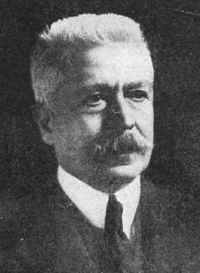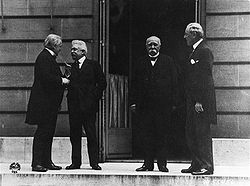Vittorio Emanuele Orlando - Picture
More about World War 1

|
|
Vittorio Emanuele Orlando

35th Prime Minister of Italy:
: In office
29 October 1917 - 23 June 1919
Monarch: Victor Emanuel III
Preceded by: Paolo Boselli
Succeeded by: Francesco Nitti
President of the Italian Chamber of Deputies:
: In office
December 1, 1919 - June 25, 1920
Preceded by: Giuseppe Marcora
Succeeded by: Enrico De Nicola
: In office
July 15, 1944 - June 25, 1946
Preceded by: Dino Grandi
Succeeded by: Carlo Sforza
:
Born: May 19, 1860
Palermo, Italy
Died: December 1, 1952 (aged 92)
Rome, Italy
Nationality: Italian
Political party: Liberal (Historical Right)
Vittorio Emanuele Orlando (May 19, 1860 - December 1, 1952) was an Italian diplomat and political figure. He was born in Palermo, Sicily. His father, a landed gentleman, delayed venturing out to register his son's birth for fear of Giuseppe Garibaldi's 1,000 patriots who had just stormed into Sicily on the first leg of their march to build an Italian nation.
In 1897 he was elected in the Italian Chamber of Deputies (Italian: Camera dei Deputati) for the district of Partinico for which he was constantly reelected until 1925. He aligned himself with Giovanni Giolitti, who was Prime Minister of Italy five times between 1892 and 1921.
Aside from his prominent political role Orlando is also known for his writings, over a hundred works, on legal and judicial issues; Orlando was himself a professor of law.
Minister and Prime Minister
A liberal, Orlando served in various roles as a minister. In 1903 he served as Minister of Education under Prime Minister Giolitti. In 1907 he was appointed Minister of Justice, a role he retained until 1909. He was re-appointed to the same ministry in November 1914 in the government of Antonio Salandra until his appointment as Minister of the Interior in June 1916 under Paolo Boselli.
After the Italian military disaster in World War I at Caporetto on October 25, 1917, which led to the fall of the Boselli government, Orlando became Prime Minister, and continued in that role through the rest of the war. He had been a strong supporter of Italy's entry in the war. Orlando was encouraged in his support of the Allies because of secret promises made by the latter promising significant Italian territorial gains in Dalmatia (at the 1915 London Pact).
The Italians later won the Battle of Vittorio Veneto in November 1918, a feat that coincided with the collapse of Austro-Hungarian Army and the end of the First World War on the Italian Front, as well as the end of the Austro-Hungarian Empire. The fact that Italy recovered and ended up on the winning side in 1918 earned for Orlando the title "Premier of Victory."
Paris Peace Conference 1919
Although, as prime minister, he was the head of the Italian delegation at the Paris Peace Conference in 1919, Orlando's inability to speak English and his weak political position at home allowed the conservative foreign minister, the half-Welsh Sidney Sonnino, to play a dominant role.
Their differences proved to be disastrous during the negotiations. Orlando was prepared to renounce territorial claims for Dalmatia to annex Rijeka (or Fiume as the Italians called the town) - the principal seaport on the Adriatic Sea - while Sonnino was not prepared to give up Dalmatia. Italy ended up claiming both and got none, running up against U.S. President Woodrow Wilson's policy of national self-determination. Orlando supported the Racial Equality Proposal introduced by Japan at the conference.

Picture - Orlando (2nd from left) at the World War I peace negotiations in Versailles with David Lloyd George, Georges Clemenceau and Woodrow Wilson (from left)
Orlando dramatically left the conference early in April 1919. He returned briefly the following month, but was forced to resign just days before the signing of the resultant Treaty of Versailles. The fact he was not a signatory to the treaty became a point of pride for him later in his life. French Prime Minister Georges Clemenceau dubbed him "The Weeper," and Orlando himself recalled proudly: "When ... I knew they would not give us what we were entitled to ... I writhed on the floor. I knocked my head against the wall. I cried. I wanted to die."
His political position was seriously undermined by his failure to secure Italian interests at the Paris Peace Conference. Orlando resigned on 23 June 1919, following his inability to acquire Fiume for Italy in the peace settlement. In December 1919 he was elected president of the Italian Chamber of Deputies, but never again served as prime minister.
Supporting Mussolini
When Benito Mussolini seized power in 1922, Orlando initially supported him, but broke with Il Duce over the murder of Giacomo Matteotti in 1924. After that he abandoned politics, in 1925 he resigned from the Chamber of Deputies, until in 1935 Mussolini's march into Ethiopia stirred Orlando's nationalism. He reappeared briefly in the political spotlight when he wrote Mussolini a fan letter.
In 1944, he made something of a political comeback. With the fall of Mussolini, Orlando became leader of the Conservative Democratic Union. He was elected speaker of the Italian Chamber of Deputies, where he served until 1946. In 1946, he was elected to the Constituent Assembly of Italy. In 1948 he was nominated senator for life, and was a candidate for the presidency of the republic (elected by Parliament) but was defeated by Luigi Einaudi. He died in 1952 in Rome.
Links with the Mafia
Orlando was connected to the Mafia and mafiosi from beginning to end of his long parliamentary career. The Mafia pentito - a state witness - Tommaso Buscetta claimed that Orlando actually was a member of the Mafia, a man of honour, himself. In Partinico he was supported by the Mafia boss Frank Coppola who had been deported back to Italy from the US.
In 1925, Orlando stated in the Italian senate that he was proud of being mafioso:
âif by the word 'mafia' we understand a sense of honour pitched in the highest key; a refusal to tolerate anyoneâs prominence or overbearing behaviour; ⦠a generosity of spirit which, while it meets strength head on, is indulgent to the weak; loyalty to friends ⦠If such feelings and such behaviour are what people mean by 'the mafia', ⦠then we are actually speaking of the special characteristics of the Sicilian soul: and I declare that I am a mafioso, and proud to be one.â
Arlacchi, Pino (1988). Mafia Business. The Mafia Ethic and the Spirit of Capitalism, Oxford: Oxford University Press, ISBN 0-19-285197-7
Dickie, John (2004). Cosa Nostra. A history of the Sicilian Mafia, London: Coronet, ISBN 0-340-82435-2
Lauren, Paul G. (1988). Power And Prejudice: The Politics And Diplomacy Of Racial Discrimination, Boulder (CO): Westview Press, ISBN 0813306787
Macmillan, Margaret (2002). Paris 1919: Six Months That Changed the World, New York: Random House, ISBN 0-375-76052-0
Servadio, Gaia (1976). Mafioso. A history of the Mafia from its origins to the present day, London: Secker & Warburg, ISBN 0440551048
More aircraft.
Source: WikiPedia